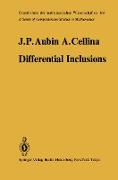Differential Inclusions
BücherAngebote / Angebote:
A great impetus to study differential inclusions came from the development of Control Theory, i.e. of dynamical systems x'(t) = f(t, x(t), u(t)), x(O)=xo "controlled" by parameters u(t) (the "controls"). Indeed, if we introduce the set-valued map F(t, x)= {f(t, x, u)}ueu then solutions to the differential equations (*) are solutions to the "differen tial inclusion" (**) x'(t)EF(t, x(t)), x(O)=xo in which the controls do not appear explicitely. Systems Theory provides dynamical systems of the form d x'(t)=A(x(t)) dt (B(x(t))+ C(x(t)), x(O)=xo in which the velocity of the state of the system depends not only upon the x(t) of the system at time t, but also on variations of observations state B(x(t)) of the state. This is a particular case of an implicit differential equation f(t, x(t), x'(t)) = 0 which can be regarded as a differential inclusion (**), where the right-hand side F is defined by F(t, x)= {vlf(t, x, v)=O}. During the 60's and 70's, a special class of differential inclusions was thoroughly investigated: those of the form X'(t)E - A(x(t)), x (0) =xo where A is a "maximal monotone" map. This class of inclusions contains the class of "gradient inclusions" which generalize the usual gradient equations x'(t) = -VV(x(t)), x(O)=xo when V is a differentiable "potential". 2 Introduction There are many instances when potential functions are not differentiable.
Folgt in ca. 10 Arbeitstagen
